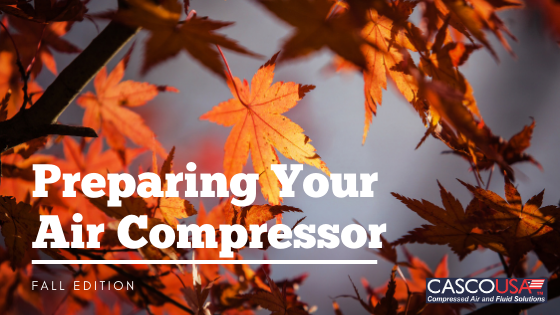Preparing Your Air Compressor: Fall Edition

The weather is changing. The days are bright; the nights are cool. It can only mean one thing – Fall has arrived. Though the spooky season and changing colors may be a comforting sign for many, it also signals that cold weather is on its way. Without proper preparation, this cold weather could spell disaster for your industrial air system.
The best way to ward off potential problems come winter is to perform the following maintenance tasks now. As the old saying goes, “An ounce of prevention is worth a pound of the cure.” In regards to your compressor system, that certainly holds true.
1. Know Your Maintenance Intervals
Every industrial machine is a little different in its needs. The specifics of an installation and its operating conditions will determine precise service needs. However, manufacturers do release guidelines to understand approximately how frequently certain tasks should be performed. You can usually find this information in a service manual or by contacting the manufacturer directly. Understand though, that certain environments may cause service needs to be sooner than the recommended intervals. CASCO USA also has a strong understanding of the typical service cycle. You can always ask us for advice on your system.
2. Check Your Filters
In addition to the ambient air, compressors suck in all the debris and contaminant surrounding a machine. The main job of the various filters is to sort through the hodgepodge of particles coming into the machine and stop them from traveling downline. Clean air is crucial to keeping your machine running efficiently. You need good air to use in your application. However, over time the filters become dirty and do not work as well. Changing your filters regularly helps to keep your machine in top shape and running as it should.
3. Drain Tank Condensate
As the temperature drops, it is always important to make sure that any lingering liquid is removed. Condensate, liquified moisture from the air, can freeze with low enough temperatures, just as any liquid can. Made of mostly water, condensate has a danger of freezing whenever the ambient temperature drops below 32 degrees Fahrenheit. The frozen condensate may cause problems for your unit, especially if the liquid has traveled into the air lines at all. For good preparation measure, make sure everything is in proper working order BEFORE the temperatures get too consistently cold.
4. Perform an Oil Change
Humid conditions like the summer often degrade the oil’s viscosity, which allows the oil to properly lubricate machine components. Without proper lubrication, the components may experience increased friction and stress causing premature machine failure. For heavy-use compressors, the oil should probably be changed quarterly.
5. Check weather strips.
Generally, a visual inspection is all that is needed to see if these are still in good operating condition. You want to make sure all insulation is keeping the heat inside. If you find any worn out areas, be sure to replace as soon as possible. Perform these visual checks several times until the cold days come to ensure your system truly is ready for winter.
Winterizing your compressor before temperatures drop too low is key to maintaining productive winter months for your system. If you aren’t certain of what fall maintenance your compressor needs, call your CASCO USA representative. They’ll be able to walk you through the process with their professional knowledge & expertise.
← EVERY COMPRESSED AIR FORMULA YOU COULD EVER NEED (And then some) Compressed Air and the Candy Industry →Comments are closed.
